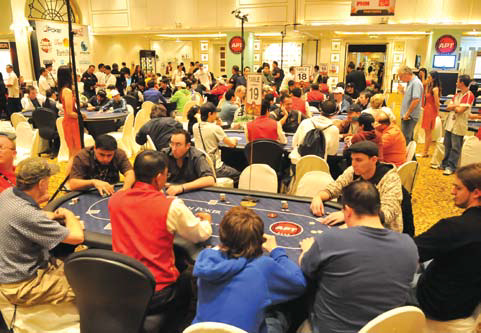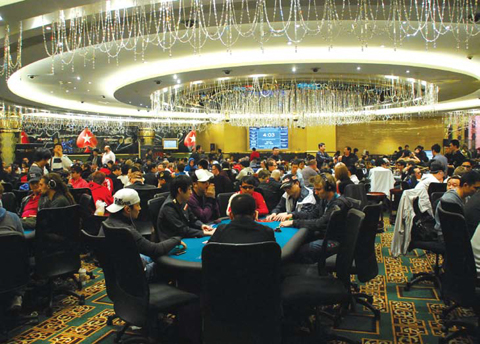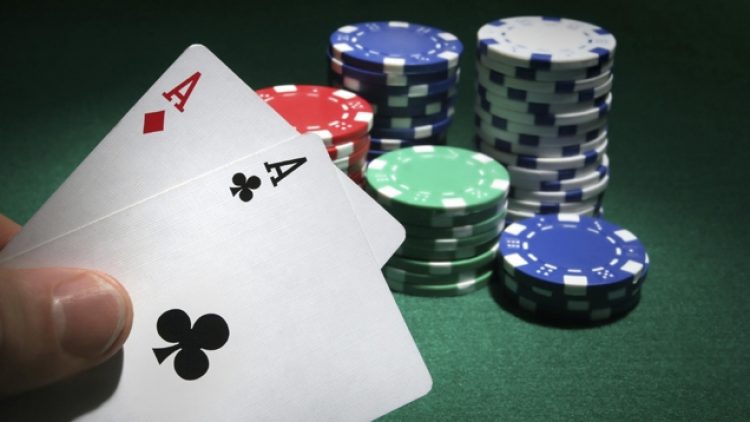Poker is hard-pressed to compete with baccarat for floor space, but China’s love affair with the game is just beginning to flower
They’ll be flying in to Hong Kong International, hopping commuter flights directly into Macau International, bobbing across the Pearl River estuary on crowded ferries—300 of the world’s best poker players, all heading for the Ballroom on the eighth floor of Galaxy Entertainment Group’s StarWorld Hotel & Casino at the end of this month for the Asia Poker Tour Macau. The event returns to Macau after a one-year hiatus—28 events over seven days, topped by a HK$25,000 buy-in No Limit Hold ’em Main Event.
So far this year, the tour has drawn more than 1,000 participants to sponsored tournaments in the Philippines, at the Waterfront Hotel & Casino in Cebu City and at Resorts World Manila, at Casino Royale in Goa and at the MGM Hotel Sanya City in Hainan, home of the 2012 China Poker Carnival, the biggest Hold ’em tournament ever held on the Mainland. Event buy-ins have ranged from US$900 to $2,700. Winners have hailed from as far away as South Africa and Sweden, if that’s any gauge of the global interest these big-money games attract.

Strong following—the APT has drawn over 1,000 participants to tournaments around Asia so far this year
In August, the APT heads to Ti Vegas Casino in Grand Bay for eight days for the €900 buy-in Asian Series Mauritius. Then it’s back to Resorts World Manila in September for a seven-day tournament with a US$1,200 buy-in Main Event. On 14th November, the US$1,100 “Asian Series Cambodia” kicks off at the Las Vegas Sun Hotel & Casino in Svay Rieng. In December, it’s back to Casino Royale Goa for the 140,000-rupee APT India. Early next year, the tour arrives in South Korea for the first time for the APT Asian Series Jeju.
Yes, poker is big business in this part of the world, and that may come as a surprise to some, what with all the media attention lavished on the casino boom I Macau, where a thinking man’s game with no advantage for the house is bound to be overshadowed, like everything else, by the insane VIP baccarat numbers that have been burning up analysts’ calculators for nearly a decade now.
“While varying from country to country, poker overall is increasing in popularity, particularly in China, Hong Kong, Taiwan and Japan,” says Danny McDonough, president and tournament director of PokerStars’ Asia Pacific Poker Tour.
Hong Kong-based AsianLogic, spying the cross-marketing potential for its far-flung holdings in online gambling and betting, snapped up the Asian Poker Tour in 2008 in only its third year of operation, the goal being to bring to the region a “world-class poker experience”—a shared honor, in point of fact, since no tournament network has been more instrumental than the APPT, powered by the international reach of the PokerStars brand, in elevating the visibility of the game, particularly among an emerging elite of competitors from the Mainland.
Last November, 575 players from 51 countries descended on the Grand Lisboa for the US$3,800 buy-in APPT Macau Main Event. In February of this year, a month before PokerStars Macau ended its three-year run at SJM Holdings’ flagship casino, the room’s $1,420 buy-in “Red Dragon” tournament drew 635 players, more than two-thirds of them Asian, including 100 participants from China, 95 from Japan and sizable contingents from Hong Kong, Taiwan and Singapore.
“Initially,” says Mr McDonough, “our biggest numbers of players were from Taiwan and Hong Kong, then Japan took over, and this year, China now has the largest proportion of participants, and given their population size, I expect this trend to continue.”
According to pokerportal.asia, China is now home to more top-money winners on the Asia circuit than Japan and Taiwan combined, almost three times as many as South Korea, and more than either India or Singapore, which both were early regional outposts of the tournament game. Only the Philippines, the first East Asian nation to embrace poker in a big way and where it is regularly televised, and Australia, which largely introduced the game to the hemisphere and boasts a World Series of Poker winner (Joe Hachem in 2005), have produced more.
This was not always the case. The China Poker Carnival was a homely affair when it was launched in Beijing in 2008 with a prize pool of RMB133,000 (US$21,000) split among a mere nine players. Away to the south, Texas Hold ’em had only just become an officially sanctioned game in Macau, where in 2007 the APPT brought the first tournament to the baccarat-mad casino enclave.
Then a gutsy 18-year-old native of Guangzhou, Zhang Dan Peng, stunned the world of high-stakes poker at the 2010 APT Macau at City of Dreams by beating a field of 161, among them Phil Ivey, Johnny Chan and Tom Dwan, to make the final table, where he overcame Bjoern Wiesler, a German almost twice his age, one-on-one, to take the Main Event and HK$1.7 million.
That year saw 100 players turn out for the APT-sponsored China Poker Carnival, whose organizers made the momentous decision to televise the event—which has been so important to the mass-marketing of pokerin the West but remains a rare occurrence in Asia and rarer still in Mainland China—and move it to a place where gamblers actually want to go, in this case to Hainan, a bonafide tourist destination that has hosted five Miss World pageants. This year’s five-day invitation-only saw more than 400 players vie for RMB1 million in total prize money. The event has proved so significant that even the Hainan Ministry of Cultural Affairs and Sports bestowed it with its official blessing and no doubt was gratified to learn that the final table was all-Chinese, despite the presence of 74 big-time players from the outside world. The winner, a relative dark horse in the money rankings named Chao Ma, took home the top prize of RMB300,000. His feat garnered coverage from CCTV, Sino Sports, GTV and Hainan TV.
Growing the game in Macau remains difficult, however, the biggest obstacle, ironically, being the city’s very success as the destination of choice for the biggest of China’s big-money gamblers, whose game of choice is baccarat. Still, poker is growing in Macau. Results compiled by the Macau Gaming Inspection and Coordination Bureau (DICJ) show that house revenues from Hold ’em have grown explosively in percentage terms, albeit from a small base, since the game was first allowed on casino floors in 2008. Last year’s MOP277 million (US$35 million) represented a fivefold increase over that time and a clear reflection of the enthusiasm with which Chinese players have taken up the game.
There are other benefits as well, less tangible but nonetheless real. Viewed by many as more a contest of skill than a game of chance, poker enjoys a mystique that aspires to the realm of romance, which accounts for its worldwide popularity even among people who don’t play and marks its foremost practitioners as the only gamblers in the world with the name recognition of celebrities. Its appeal is akin to that of a spectator sport, and that gives it credibility as a tourist draw, an amenity that contributes in an important way to rounding out a casino’s overall offering and raising the city’s international profile.
In places like the Philippines, which has more than 20 licensed poker rooms, the game has built a substantial grassroots following. But viewed from the perspective of the casino bottom line in Macau, the returns on this kind of goodwill are a pittance measured against the enormity of VIP baccarat, which comprises 70-75% of the market and by itself generates more than three times the annual revenue of every table and slot machine on the Las Vegas Strip combined. (Actually, Hold ’em has a ways to go to catch up to stud poker in Macau, a game with a much longer lineage in the market and almost five times the annual revenue.)
The choice between the miniscule profit from the rake at a poker table and a VIP room table delivering upwards of US$230,000 a day in average win is one that’s already been made for most operators. This is especially true in light of the 3% cap the government has imposed beginning next year on the number of new gaming tables, which, however specious, has even prestigious cash games like those in the poker room at Wynn Macau fighting for survival. It’s a reality to which the authorities themselves have had to accede, and recently they’ve let it be known that they’ll allow 20 poker tables to count as one regular “table” under the cap.
Fortunately, there are plenty of aficionados, respected players like Winfred Yu who are also savvy marketers and are determined to secure a future for poker in Macau with creative responses like the Poker King Club on the third floor of Galaxy’s StarWorld, located just behind one of the VIP rooms, whose denizens, interestingly enough, are precisely those whom PKC is set up to attract.
Backed by junket operator extraordinaire Suncity Group in partnership with Macau-based Kings Consulting, Poker King Club manages, markets and staffs the room for Galaxy in exchange for a fee, an arrangement that liberates the operator from incurring those costs, thus making it more palatable financially to provide the space. It’s a model employed with great success in casino sports books the world over and one Kings Consulting and Suncity hope to replicate throughout the region.
Winfred Yu, a fixture on the big-money Asia circuit and president of Kings Consulting, describes the eight-table room as one that “combines a VIP junket room with mainstream poker”.
Elegantly appointed, staffed with hostesses and chip runners and fitted with all the comforts and services a high roller would expect, Poker King Club has become known for hot Sit n’ Go action and especially for its “nosebleed games”—ultra-high-stakes affairs that draw top-name pros from around the world eager for a crack at the bankrolls of a stream of whales normally to be found indulging their lust for risk at private baccarat tables like the ones next door to PKC. Mr Ivey, Mr Dwan, Sam Trickett and Andrew Robl have all been known to stop by for what has become known as the Big Game, where blinds run as high as HK$30,000/$60,000.
The idea was devised by Mr Yu, who encourages credit play and set up Poker King Club with the ability to issue markers. “It’s a concept of the VIP junket and poker together, that’s how we built the biggest game in the world.”
PKC also employs a host of casino-style innovations the average player would appreciate: like a rewards card that accrues points for the holder and qualifies them to receive gifts, invitations to special events and other perks, a “Refer a Friend” program, and a “Spin to Win” promotion where four times a day a player from each table is selected to try their luck at a wheel for cash and prizes.
“The goal, I hope, is that every casino will look at the [Poker King Club] concept and partner with us in all the poker rooms in Macau,” says Mr Yu. “Look at Suncity, how fast they’ve expanded, from one room to 13, and in different countries. We won’t expand that fast, but we want to be operating in the same way across Macau. That’s a win-win, be believe, for everybody, and it will raise the awareness of poker in Mainland China.”
To that end, “Poker Secrets,” another brainchild of Kings Consulting, launched earlier this year on free satellite broadcaster Lotus TV. It’s a mix of ESPN-style game coverage with tutorials, guides and commentary airing on Friday nights from 10 to 11. Mr Yu hopes it will carry the word into the 40 million households, stretching from Tokyo to Beijing and from Taipei to Auckland, that comprise Lotus’ reach.
“Historically, poker has grown where there has been TV exposure, but this has been very limited in Asia as gambling content on television is very restricted,” says Tom Hall, a co-founder of AsianLogic and former group CEO of Playtech who currently serves as business development director for ONEworks, a sports book services provider. “It’s interesting to note that where it is allowed on TV, poker jumped in popularity.”
The Poker King Club hosted its first major tournament in April, the APT-accredited Asian Poker King, which drew 174 players to the ballroom at StarWorld for prize money of HK$870,000.
Its stay at the Grand Lisboa ended, PokerStars Macau is enjoying a homecoming of sorts, taking up residence under the direction of Danny McDonough this summer on the main floor at Galaxy’s Grand Waldo, where he helped introduce tournament Hold ’em to Macau back in 2007. The new venue will host daily cash games and weekly tournaments, spiced with big-money special events: two HK$11,000 buy-in “Red Dragons,” culminating in September with the HK$4.5 million Macau Poker Cup Championship, and in October, a HK$100,000 buy-in Asia Championship of Poker kicks off, a 17-day extravaganza running through early November at the Grand Waldo’s new Conference and Exhibition Center. The prize pool: HK$10 million.
“Macau has every opportunity to become home to one of the biggest live events in the world,” Mr McDonough says. “One day, an event in Macau, in my opinion, will rival the WSOP in numbers and prize money.”

Recently vacated—PokerStars Macau recently moved out of its home at the Grand Lisboa (pictured here) and back to Grand Waldo





























